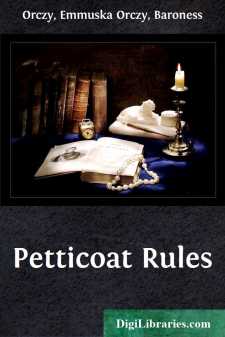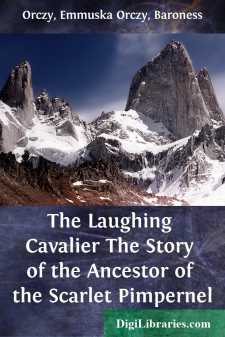Categories
- Antiques & Collectibles 13
- Architecture 36
- Art 48
- Bibles 22
- Biography & Autobiography 813
- Body, Mind & Spirit 142
- Business & Economics 28
- Children's Books 17
- Children's Fiction 14
- Computers 4
- Cooking 94
- Crafts & Hobbies 4
- Drama 346
- Education 46
- Family & Relationships 57
- Fiction 11829
- Games 19
- Gardening 17
- Health & Fitness 34
- History 1377
- House & Home 1
- Humor 147
- Juvenile Fiction 1873
- Juvenile Nonfiction 202
- Language Arts & Disciplines 88
- Law 16
- Literary Collections 686
- Literary Criticism 179
- Mathematics 13
- Medical 41
- Music 40
- Nature 179
- Non-Classifiable 1768
- Performing Arts 7
- Periodicals 1453
- Philosophy 64
- Photography 2
- Poetry 896
- Political Science 203
- Psychology 42
- Reference 154
- Religion 513
- Science 126
- Self-Help 84
- Social Science 81
- Sports & Recreation 34
- Study Aids 3
- Technology & Engineering 59
- Transportation 23
- Travel 463
- True Crime 29
Emmuska Orczy Orczy
Emmuska Orczy was a Hungarian-born British novelist, playwright, and artist, best known for her "The Scarlet Pimpernel" series. Born on September 23, 1865, in Tarnaörs, Hungary, she moved to London in her teens and gained widespread popularity for her adventure tales featuring the heroic and elusive Pimpernel. Her works, characterized by their swashbuckling plots and vibrant characters, significantly contributed to the genre of historical fiction and have inspired numerous adaptations in film, theater, and television.
Author's Books:
Sort by:
CHAPTER I "Beautiful for situation, the joy of the whole earth, is Mount Zion...."—Psalm xlviii. 2. And it came to pass in Rome after the kalends of September, and when Caius Julius Cæsar Caligula ruled over Imperial Rome. Arminius Quirinius, the censor, was dead. He had died by his own hand, and thus was a life of extortion and of fraud brought to an ignominious end through the force of...
more...
Paris: 1783. “Coward! Coward! Coward!” The words rang out, clear, strident, passionate, in a crescendo of agonised humiliation. The boy, quivering with rage, had sprung to his feet, and, losing his balance, he fell forward clutching at the table, whilst with a convulsive movement of the lids, he tried in vain to suppress the tears of shame which were blinding him. “Coward!” He tried to shout...
more...
THE LANDING AT JOUAN The perfect calm of an early spring dawn lies over headland and sea—hardly a ripple stirs the blue cheek of the bay. The softness of departing night lies upon the bosom of the Mediterranean like the dew upon the heart of a flower. A silent dawn. Veils of transparent greys and purples and mauves still conceal the distant horizon. Breathless calm rests upon the water and that awed...
more...
CHAPTER IWHICH TELLS OF A VERY COMMONPLACE INCIDENT No! No! she was not going to gush!—Not even though there was nothing in the room at this moment to stand up afterward before her as dumb witness to a moment's possible weakness. Less than nothing in fact: space might have spoken and recalled that moment . . . infinite nothingness might at some future time have brought back the memory of it . ....
more...
CHAPTER IA FAREWELL BANQUET "D'Aumont!" "Eh? d'Aumont!" The voice, that of a man still in the prime of life, but already raucous in its tone, thickened through constant mirthless laughter, rendered querulous too from long vigils kept at the shrine of pleasure, rose above the incessant babel of women's chatter, the din of silver, china and glasses passing to and fro....
more...
CHAPTER I THE HOUSE OF A KENTISH SQUIRE Master Hymn-of-Praise Busy folded his hands before him ere he spoke: "Nay! but I tell thee, woman, that the Lord hath no love for such frivolities! and alack! but 'tis a sign of the times that an English Squire should favor such evil ways." "Evil ways? The Lord love you, Master Hymn-of-Praise, and pray do you call half an hour at the skittle...
more...
CHAPTER I A ROLAND FOR HIS OLIVER 1. My name is Ratichon—Hector Ratichon, at your service, and I make so bold as to say that not even my worst enemy would think of minimizing the value of my services to the State. For twenty years now have I placed my powers at the disposal of my country: I have served the Republic, and was confidential agent to Citizen Robespierre; I have served the Empire, and was...
more...
CHAPTER I. IN THE THEATRE NATIONAL And yet people found the opportunity to amuse themselves, to dance and to go to the theatre, to enjoy music and open-air cafes and promenades in the Palais Royal. New fashions in dress made their appearance, milliners produced fresh "creations," and jewellers were not idle. A grim sense of humour, born of the very intensity of ever-present danger, had dubbed...
more...
CHAPTER I PARIS: SEPTEMBER, 1792 A surging, seething, murmuring crowd of beings that are human only in name, for to the eye and ear they seem naught but savage creatures, animated by vile passions and by the lust of vengeance and of hate. The hour, some little time before sunset, and the place, the West Barricade, at the very spot where, a decade later, a proud tyrant raised an undying monument to the...
more...
Does it need one? If so it must also come from those members of the Blakeney family in whose veins runs the blood of that Sir Percy Blakeney who is known to history as the Scarlet Pimpernel—for they in a manner are responsible for the telling of this veracious chronicle. For the past eight years now—ever since the true story of The Scarlet Pimpernel was put on record by the present author—these...
more...











